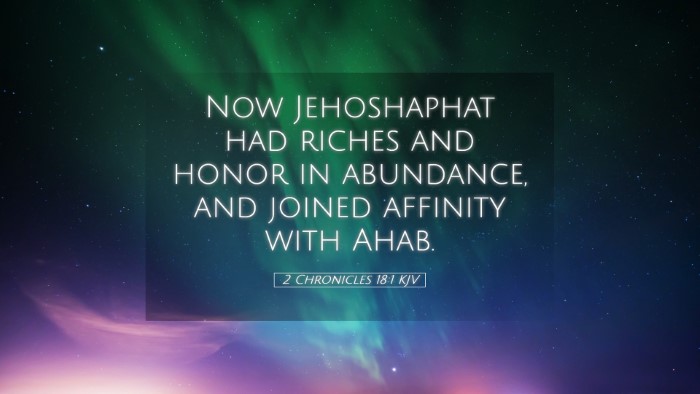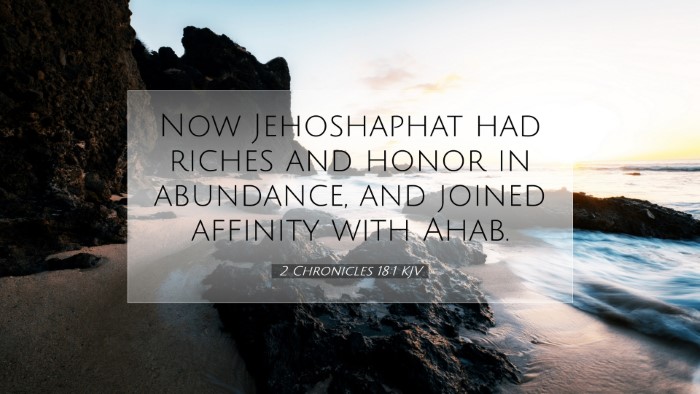Commentary on 2 Chronicles 18:1
Verse Summary: "Now Jehoshaphat had riches and honor in abundance, and joined affinity with Ahab."
Introduction
This verse sets the stage for a complex narrative involving the king of Judah, Jehoshaphat, and the king of Israel, Ahab. It introduces significant themes of alliance, wealth, and the moral implications of seeking partnerships with those who do not share the same faith and values. Various commentaries from esteemed theologians have explored these themes in depth, providing understanding for pastors, students, theologians, and scholars alike.
Jehoshaphat's Prosperity
2 Chronicles 18:1 begins by highlighting Jehoshaphat's wealth and honor. According to Matthew Henry's Commentary, Jehoshaphat's riches signify God’s favor upon him. His prosperity can be seen as a result of his commitment to following God’s laws and receiving divine blessings. Henry emphasizes that prosperity can be a double-edged sword, providing opportunities for good and potential for leading one astray.
Albert Barnes echoes this sentiment, suggesting that wealth must be handled with wisdom and restraint. He warns that prosperity can make individuals vulnerable to pride and complacency, thus detracting from their dependence on God.
The Alliance with Ahab
The verse mentions Jehoshaphat's alliance with Ahab, which becomes a central topic in subsequent chapters. Adam Clarke’s Commentary notes that alliances with ungodly rulers can lead to disastrous consequences. Jehoshaphat’s decision to forge a bond with Ahab, who was characterized by his idolatrous practices, serves as a cautionary tale regarding interfaith relationships and collaborations.
Moreover, Clarke points out that Jehoshaphat's integrity was compromised through this alliance. By joining affinity with Ahab, Jehoshaphat risked the moral standing of Judah and, consequently, his relationship with God. This commentary invites reflection on the nature of alliances today, encouraging leaders to consider the potential moral implications of their partnerships.
Contextual Analysis
This verse is part of the broader narrative concerning the reigns of both Jehoshaphat and Ahab. Henry highlights that this alliance may have been politically motivated due to the need for solidarity against external threats, specifically from Syria. However, the motivations behind alliances should always be carefully assessed through the lens of faith.Barnes states that such endeavors require divine guidance to ensure that they align with the will of God.
Theological Implications
The alliances we form in our lives—whether personal, professional, or ecclesiastical—reflect our values and belief systems. Matthew Henry elucidates the potential spiritual dangers of forming bonds with those who do not adhere to the same foundational beliefs. It ignites a conversation on the understanding of 'yoking together' as found in 2 Corinthians 6:14, drawing parallels between Jehoshaphat's actions and modern applications.
Lessons for Christian Leaders and Scholars
- The Importance of Righteous Alliances: Christian leaders are called to seek alliances that further kingdom purposes, ensuring the integrity of their leadership remains untouched by worldly influences.
- Wealth and Responsibility: Jehoshaphat’s wealth should remind leaders of their responsibility to manage resources in a manner that glorifies God and serves community needs.
- Seeking Divine Guidance: Before forming alliances, wisdom dictates that prayer and consultation of God’s word be prioritized, as Henry suggests, to avoid disastrous consequences.
Conclusion
2 Chronicles 18:1 reveals profound truths about the nature of prosperity and the importance of spiritual discernment in decision-making. Through the commentary of Matthew Henry, Albert Barnes, and Adam Clarke, a compelling narrative unfolds that challenges modern believers to be vigilant in their alliances and faithful in their stewardship of blessings. This passage serves as a timeless reminder of the necessity of aligning one's life with God’s will, offering deep insights relevant for pastors, students, theologians, and scholars as they navigate the complexities of faith in a multifaceted world.


